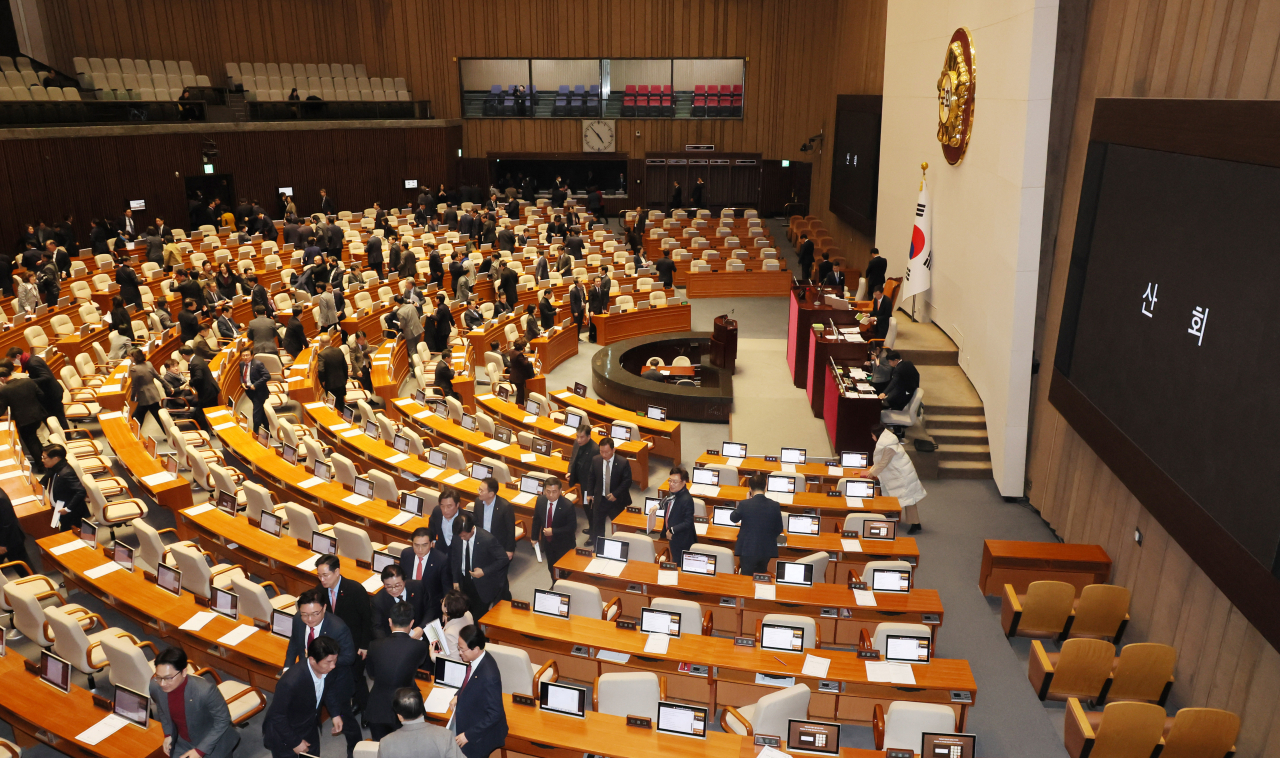 |
Lawmakers leave the main hall at the National Assembly after passing the government budget for next year, Thursday. (Yonhap) |
The National Assembly on Thursday passed the government budget for 2024 amounting to 656.6 trillion won ($502 billion).
The final package showed a 2.8 percent gain from that of last year’s, marking the smallest on-year increase for the government budget. It was down 300 billion won from the government proposal of 656.9 trillion won submitted in September.
The government's fiscal soundness will continue to face challenges next year, as the proposed tax revenue stands at 612.2 trillion won, down nearly 45 trillion won from the projected spending amount. The figure is also 2.2 percent smaller than this year's 625.7 trillion won.
The consolidated fiscal account is to log a deficit of 44.4 trillion won.
The managed fiscal balance, excluding the social security funds balance, is to post a deficit of 91.6 trillion won. The figure is a key gauge of a country's fiscal health.
Next year’s budget includes an increase of the basic livelihood allowance given to those in the lowest income bracket by 213,000 won, higher than the total 196,000 won increase seen between 2018 to 2022.
The government also plans to help out small business owners, injecting 300 billion won to cut interest rates for loans taken out by underprivileged borrowers and putting in another 252 billion won to support their electricity bills, reflecting the raised rates.
For young Koreans aged 19-34, it will put in 69 billion won for another year to support their monthly housing rental costs by 200,000 won per month. The policy was set to end in 2023, but has been extended to next year..
To support the disabled, it will add an extra 10,000 won to pension benefits, while raising the subsidy given to cover commute expenses of severely disabled laborers from 50,000 won to 70,000 won.
Responding to the surging number of victims who are suffering from “jeonse” scams, the government will inject 180 billion won, helping them take out loans or purchase troubled housing.
Increasing connectivity in the Greater Seoul area is another key mission for the 2024 budget. The government will put in extra cars for Seoul Subway Line Nos. 4, 7, 9 and the Gimpo Goldenline where overcrowding has become a major issue.
For the defense sector, the government has decided to spend 242 billion won for the advanced arms system, including the establishment of a homegrown three-axis system against North Korea's nuclear and missile threats.
To boost public safety, escalators at subway stations will be renovated to prevent sudden reverse operations. Some 7.5 billion won has been allotted for the initiative.
The ruling People Power Party and the main opposition Democratic Party of Korea approved the Yoon Suk Yeol administration’s second budget, 19 days after its legal deadline of Dec. 2.







![[Today’s K-pop] Blackpink’s Jennie, Lisa invited to Coachella as solo acts](http://res.heraldm.com/phpwas/restmb_idxmake.php?idx=644&simg=/content/image/2024/11/21/20241121050099_0.jpg)